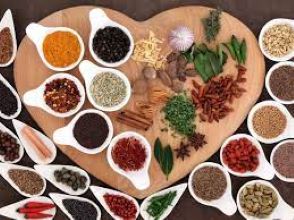Your heart deserves the best care to keep it healthy and active throughout your life. Fortunately, the rich tapestry of Indian cuisine offers a treasure trove of spices that not only enhance flavor but also promote cardiovascular health. In this article, we’ll explore six Indian spices known for their heart-boosting properties. We’ll provide tips on incorporating them into your diet, along with external links and FAQs to help you prioritize your heart’s well-being.
The Heart-Healthy Power of Indian Spices
Indian spices are celebrated for their versatility and the numerous health benefits they offer, including those that support heart health. Here are six Indian spices that can help keep your heart young and active:
1. Turmeric
- Heart Benefit: Turmeric contains curcumin, a powerful anti-inflammatory and antioxidant compound that may reduce the risk of heart disease by improving blood vessel function and reducing plaque buildup.
2. Cinnamon
- Heart Benefit: Cinnamon helps lower blood pressure, reduce LDL cholesterol levels, and improve insulin sensitivity, all of which are crucial for heart health.
3. Garlic
- Heart Benefit: Garlic can lower blood pressure, reduce cholesterol levels, and has anti-inflammatory properties that may reduce the risk of atherosclerosis.
4. Ginger
- Heart Benefit: Ginger has anti-inflammatory and antioxidant properties that may help reduce the risk of heart disease by improving cholesterol levels and reducing oxidative stress.
5. Cardamom
- Heart Benefit: Cardamom can help lower blood pressure and improve overall cardiovascular health due to its antioxidant and anti-inflammatory effects.
6. Fenugreek
- Heart Benefit: Fenugreek seeds can help lower cholesterol levels and improve blood sugar control, reducing the risk of heart disease.
Tips for Incorporating Indian Spices into Your Diet
To harness the heart-boosting benefits of these Indian spices, consider the following tips:
- Turmeric: Add a pinch of turmeric to curries, soups, and stews.
- Cinnamon: Sprinkle cinnamon on oatmeal, yogurt, or in your morning coffee.
- Garlic: Use fresh garlic in your cooking, or consider garlic supplements.
- Ginger: Make ginger tea or add grated ginger to smoothies.
- Cardamom: Use cardamom pods in tea or ground cardamom in desserts.
- Fenugreek: Sprout fenugreek seeds or use fenugreek leaves in Indian dishes.
External Links:
For further information on the heart-healthy benefits of Indian spices, explore these external resources:
- American Heart Association – Spices and Herbs for Heart Health
- National Center for Biotechnology Information – Curcumin and Heart Health
FAQs:
Here are some frequently asked questions related to Indian spices and heart health:
Q1: Can I take spice supplements instead of using spices in my cooking?
A1: While supplements can be beneficial, it’s best to incorporate spices into your diet through cooking to enjoy their full range of health benefits.
Q2: Are there any specific recipes that highlight these heart-healthy spices?
A2: Yes, there are many Indian recipes that use these spices. Explore Indian cuisine for dishes like turmeric-infused curries and cinnamon-spiced desserts.
Q3: How much of these spices should I consume daily for heart health?
A3: The ideal daily consumption can vary. It’s best to consult a healthcare provider or nutritionist for personalized recommendations.
Indian spices not only add depth and flavor to your dishes but also offer a myriad of health benefits, especially for your heart. By incorporating spices like turmeric, cinnamon, garlic, ginger, cardamom, and fenugreek into your diet, you can take proactive steps to support your cardiovascular health. Embrace the flavors of Indian cuisine and prioritize your heart’s well-being with these heart-healthy spices.












